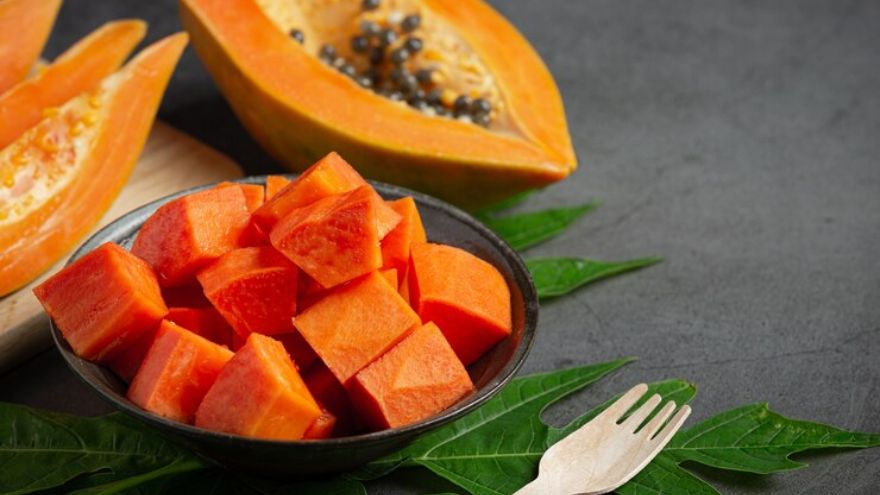
Papaya, often referred to as the "fruit of the angels," is not only a delicious tropical delight but also a nutritional powerhouse packed with numerous health benefits. Native to Central America, this vibrant orange fruit has made its way into diets around the world due to its unique taste and impressive health-enhancing properties. Whether consumed fresh, dried, or juiced, papaya offers a plethora of benefits that can significantly improve your overall well-being. In this blog, we'll explore the various health benefits of papaya, from its rich nutrient profile to its role in disease prevention, digestive health, skin care, and beyond.
Nutritional Profile of Papaya
Before diving into the specific health benefits, it’s important to understand what makes papaya so nutritionally rich. A single small papaya (about 152 grams) contains:
- Calories: 59
- Protein: 1 gram
- Carbohydrates: 15 grams
- Fiber: 3 grams
- Vitamin C: 157% of the Daily Value (DV)
- Vitamin A: 33% of the DV
- Folate (Vitamin B9): 14% of the DV
- Potassium: 11% of the DV
- Vitamin E: 5% of the DV
- Magnesium: 4% of the DV
Papaya is also rich in antioxidants, particularly carotenoids such as beta-carotene and lycopene. These compounds are crucial for neutralizing free radicals, thereby reducing oxidative stress and protecting against various chronic diseases.
Top 16 benefits of eating papaya
1. Boosts Immunity
Papaya is an excellent source of vitamin C, providing more than 150% of the daily recommended intake in just one serving. Vitamin C is a powerful antioxidant that strengthens the immune system, helping the body ward off infections and diseases. Regular consumption of papaya can help reduce the severity and duration of common colds and flu, and it may also play a role in preventing more serious conditions like pneumonia.
2. Improves Digestive Health
One of the most well-known benefits of papaya is its ability to aid digestion. This is primarily due to an enzyme called papain, which is found in high concentrations in the fruit. Papain breaks down proteins in the stomach, making it easier for the body to digest and absorb nutrients. This enzyme is so effective that it’s often used as a meat tenderizer.
Papaya is also rich in dietary fiber, which adds bulk to stool and promotes regular bowel movements, helping to prevent constipation. Moreover, the fiber content in papaya supports a healthy gut microbiome, which is essential for overall digestive health.
3. Promotes Heart Health
The heart health benefits of papaya are substantial, largely due to its high content of vitamins, antioxidants, and fiber. The potassium in papaya helps to regulate blood pressure by counteracting the effects of sodium in the diet. This can reduce the risk of hypertension, which is a major risk factor for heart disease.
The fiber in papaya also plays a crucial role in heart health by helping to lower cholesterol levels. Soluble fiber binds to cholesterol in the digestive system, preventing it from being absorbed into the bloodstream. Additionally, the antioxidants, particularly vitamin C and lycopene, help to prevent the oxidation of cholesterol, which is a key step in the development of atherosclerosis (hardening of the arteries).
4. Aids in Weight Loss
If you’re looking to shed some pounds, papaya could be a great addition to your diet. The fruit is low in calories and high in dietary fiber, which helps to keep you feeling full for longer periods, reducing the likelihood of overeating. The fiber also aids in digestion and helps regulate blood sugar levels, which can prevent insulin spikes that lead to fat storage.
Moreover, papaya’s high water content keeps the body hydrated and supports metabolic processes, making it easier to burn calories. The combination of low calories, high fiber, and rich nutrient content makes papaya an ideal snack for those aiming to lose weight or maintain a healthy weight.
5. Enhances Skin Health
Papaya is a boon for the skin, offering numerous benefits that contribute to a healthy, glowing complexion. The high vitamin C content plays a key role in collagen production, a protein that gives the skin its structure and elasticity. Adequate collagen levels can reduce the appearance of fine lines and wrinkles, keeping the skin looking youthful.
The enzyme papain also has exfoliating properties, helping to remove dead skin cells and promote the regeneration of new ones. This can lead to smoother, more radiant skin. Additionally, the antioxidants in papaya, such as beta-carotene, neutralize free radicals that cause skin damage and aging.
For these reasons, papaya is often used in homemade face masks and beauty treatments. Whether applied topically or consumed as part of your diet, papaya can significantly improve skin health.
6. Supports Eye Health
Papaya is a rich source of vitamin A, which is essential for maintaining good vision. Vitamin A protects the corneas and helps in the formation of visual pigments in the retina, which are necessary for low-light and color vision. Regular consumption of papaya can help prevent eye disorders such as night blindness and age-related macular degeneration (AMD).
In addition to vitamin A, papaya contains lutein and zeaxanthin, two powerful antioxidants that are known to protect the eyes from damage caused by blue light and oxidative stress. These antioxidants accumulate in the retina and help filter out harmful light, reducing the risk of cataracts and AMD.
7. Reduces Inflammation
Chronic inflammation is a root cause of many diseases, including heart disease, diabetes, and cancer. Papaya has potent anti-inflammatory properties due to its rich content of vitamins, enzymes, and antioxidants. Vitamin C, vitamin E, and beta-carotene work together to reduce inflammation by neutralizing free radicals that can damage cells and tissues.
Papain and chymopapain, two enzymes found in papaya, are particularly effective at reducing inflammation. They work by breaking down inflammatory molecules, which can help alleviate conditions such as arthritis, asthma, and inflammatory bowel disease. Consuming papaya regularly can be a natural way to keep inflammation under control.
8. Protects Against Cancer
The antioxidant properties of papaya extend to its potential role in cancer prevention. Free radicals and oxidative stress are major contributors to the development of cancer, as they can cause DNA damage and promote the growth of cancerous cells. The high levels of antioxidants in papaya, including vitamin C, beta-carotene, and lycopene, help to neutralize these harmful free radicals.
Research has shown that lycopene, in particular, may help reduce the risk of prostate, lung, and stomach cancers. Papaya’s rich content of folate also plays a role in cancer prevention by supporting DNA synthesis and repair, which helps prevent mutations that can lead to cancer.
Additionally, papaya contains compounds called flavonoids, which have been shown to have anti-cancer properties. These compounds inhibit the growth of cancer cells and induce apoptosis (programmed cell death) in various types of cancer.
9. Supports Respiratory Health
Papaya is beneficial for respiratory health, particularly in preventing and managing conditions like asthma. The anti-inflammatory and antioxidant properties of the fruit help to reduce inflammation in the airways, which is a key factor in asthma and other respiratory diseases.
Vitamin C, in particular, plays a crucial role in respiratory health by reducing oxidative stress in the lungs and enhancing immune function. Studies have shown that individuals with higher vitamin C intake have a lower risk of developing asthma and other respiratory conditions.
Furthermore, the beta-carotene in papaya has been linked to a lower risk of respiratory infections. This makes papaya an excellent dietary choice for those looking to support their lung health and prevent respiratory issues.
10. Enhances Wound Healing
Papaya has been used for centuries in traditional medicine to aid in wound healing. The enzymes papain and chymopapain not only reduce inflammation but also help in the healing process by removing dead tissue from wounds, allowing new tissue to form more effectively.
The high vitamin C content in papaya also plays a vital role in wound healing. Vitamin C is essential for the synthesis of collagen, which is necessary for the repair of tissues and blood vessels. Additionally, the antioxidants in papaya protect the wound site from infection by neutralizing harmful free radicals.
Applying mashed papaya directly to wounds or consuming the fruit can accelerate the healing process and reduce the risk of infection.
11. Regulates Blood Sugar Levels
For those with diabetes or at risk of developing diabetes, papaya can be a beneficial addition to the diet. The fruit has a low glycemic index, meaning it releases sugar slowly into the bloodstream, preventing sudden spikes in blood glucose levels. The fiber in papaya also helps to regulate blood sugar levels by slowing down the absorption of sugars.
Moreover, papaya is rich in flavonoids, which have been shown to improve insulin sensitivity and reduce the risk of type 2 diabetes. The antioxidants in papaya also protect the pancreas, the organ responsible for insulin production, from oxidative stress, further supporting healthy blood sugar levels.
12. Supports Kidney Health
Papaya is beneficial for kidney health, particularly in preventing kidney stones. The fruit is rich in potassium, which helps to regulate the balance of fluids and minerals in the body, reducing the risk of stone formation. Potassium also helps to flush out excess sodium and toxins from the kidneys, promoting overall kidney function.
The antioxidants in papaya, especially vitamin C and beta-carotene, protect the kidneys from oxidative damage, which can lead to chronic kidney disease. Regular consumption of papaya can help maintain healthy kidney function and reduce the risk of kidney-related issues.
13. Improves Bone Health
Papaya is a good source of vitamin K, a nutrient that plays a crucial role in bone health. Vitamin K is essential for the formation of osteocalcin, a protein that helps to bind calcium to the bone matrix, strengthening the bones. Adequate vitamin K intake can reduce the risk of fractures and osteoporosis.
In addition to vitamin K, papaya contains calcium and magnesium, both of which are important for maintaining strong and healthy bones. The anti-inflammatory properties of papaya also help to reduce the risk of bone loss due to chronic inflammation.
14. Enhances Hair Health
Papaya’s rich nutrient profile also benefits hair health. The vitamins and minerals in papaya, particularly vitamin C, vitamin E, and beta-carotene, nourish the scalp and hair follicles, promoting healthy hair growth. Vitamin C boosts collagen production, which strengthens the hair and prevents breakage.
Papaya’s antifungal properties help to control dandruff and other scalp infections, keeping the scalp healthy and free from irritation. Additionally, the folic acid in papaya improves blood circulation to the scalp, ensuring that the hair follicles receive the nutrients they need for optimal growth.
15. Promotes Healthy Pregnancy
Papaya is a great fruit for pregnant women, as it provides essential nutrients that support both the mother and the developing baby. The high folate content in papaya is particularly important during pregnancy, as it helps prevent neural tube defects in the fetus.
The fruit’s rich vitamin C content supports the immune system and aids in the absorption of iron, which is crucial for preventing anemia during pregnancy. Papaya’s fiber content also helps prevent constipation, a common issue during pregnancy.
However, it’s important to note that unripe papaya contains latex, which can induce contractions and should be avoided during pregnancy. Only ripe papaya is recommended for pregnant women.
16. Supports Mental Health
The benefits of papaya extend to mental health as well. The fruit is rich in antioxidants, particularly vitamin C, which has been shown to reduce the risk of cognitive decline and support overall brain health. The anti-inflammatory properties of papaya also protect the brain from inflammation, which is linked to conditions like Alzheimer’s disease.
Papaya contains several B vitamins, including folate and vitamin B6, which are important for brain function and mental health. These vitamins help to regulate mood and prevent conditions like depression and anxiety.
Additionally, the high potassium content in papaya supports proper nerve function, which is essential for maintaining mental clarity and focus.
Conclusion
Papaya is truly a superfood, offering an impressive array of health benefits that can improve nearly every aspect of your well-being. From boosting immunity and promoting digestive health to supporting heart health, enhancing skin and hair health, and even protecting against chronic diseases, this tropical fruit is a must-have in your diet.
Incorporating papaya into your daily routine is easy and versatile. Whether you enjoy it fresh, in smoothies, or as part of a salad, you can reap the numerous health benefits this fruit has to offer. So, the next time you’re looking for a delicious and nutritious snack, reach for a papaya and give your body the natural boost it deserves.
Frequently Asked Questions About Papaya
1. What are the primary health benefits of eating papaya?
Ans. Papaya offers numerous health benefits, including boosting immunity, improving digestive health, promoting heart health, aiding in weight loss, enhancing skin and hair health, supporting eye and kidney health, and potentially reducing the risk of chronic diseases like cancer.
2. Is it safe to eat papaya during pregnancy?
Ans. While ripe papaya is safe and beneficial during pregnancy due to its rich content of vitamins, minerals, and fiber, unripe papaya should be avoided as it contains latex, which can induce contractions and may lead to complications.
3. How does papaya aid in digestion?
Ans. Papaya contains an enzyme called papain, which helps break down proteins in the stomach, making digestion easier. Its high fiber content also promotes regular bowel movements and supports a healthy gut microbiome.
4. Can papaya help with weight loss?
Ans. Yes, papaya is low in calories and high in dietary fiber, which helps keep you full for longer, reducing the likelihood of overeating. Its water content also supports hydration and metabolic processes, aiding in weight management.
5. How can papaya improve skin health?
Ans. Papaya is rich in vitamin C, which boosts collagen production, helping to reduce wrinkles and maintain skin elasticity. The enzyme papain exfoliates dead skin cells, promoting a smooth, radiant complexion. The fruit’s antioxidants also protect the skin from damage caused by free radicals.
6. Is papaya beneficial for heart health?
Ans. Papaya supports heart health through its high potassium content, which helps regulate blood pressure, and its fiber, which can lower cholesterol levels. The antioxidants in papaya, such as vitamin C and lycopene, prevent cholesterol oxidation, reducing the risk of atherosclerosis.
7. Can papaya help regulate blood sugar levels?
Ans. Yes, papaya has a low glycemic index and is high in fiber, which helps slow the absorption of sugar into the bloodstream, preventing spikes in blood glucose levels. Its flavonoids also improve insulin sensitivity, making it a good choice for those managing diabetes.
8. How does papaya support eye health?
Ans. Papaya is rich in vitamin A, lutein, and zeaxanthin, which are essential for maintaining good vision and protecting the eyes from damage caused by blue light and oxidative stress. Regular consumption can help prevent eye disorders like night blindness and age-related macular degeneration (AMD).
9. What is the best way to eat papaya for maximum health benefits?
Ans. Papaya can be eaten fresh, added to salads, smoothies, or yogurt, or even used in cooking. To maximize its health benefits, it’s best to consume ripe papaya, as it is more nutrient-dense and easier to digest than unripe papaya.
10. Are there any side effects or risks associated with eating papaya?
Ans. While papaya is generally safe for most people, consuming large amounts of papaya, especially unripe, may cause digestive issues like stomach upset due to the high levels of papain and latex. Additionally, individuals with a latex allergy should avoid papaya, as it may trigger allergic reactions.



